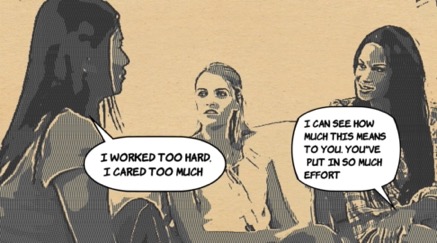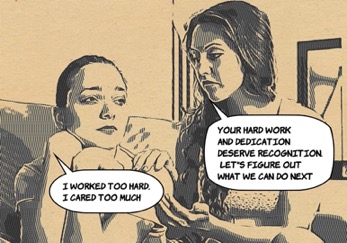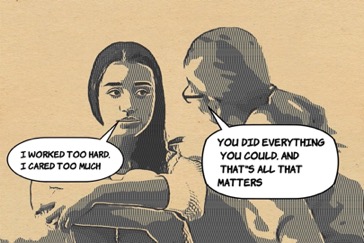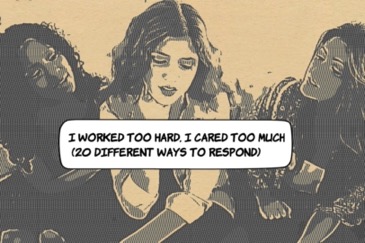Working hard and caring deeply are admirable qualities, but they can come at a cost. When people say ‘I worked too hard, I cared too much,’ they are often expressing feelings of exhaustion, frustration, and even resentment.
This phrase “I worked too hard, I cared too much” encompasses a few key ideas:
Overcommitment
People who work too hard and care too much often take on more responsibilities than they can reasonably handle.
They overcommit themselves out of a desire to do the best job possible and help as many people as they can.
Burnout
Constantly working hard and caring deeply without limits can eventually lead to burnout. This means a person feels emotionally, mentally, and physically drained.
They may experience symptoms like fatigue, insomnia, irritability, and reduced ability to focus.
Feeling Taken For Granted
When people work too hard and care too much without proper acknowledgment or reciprocation, they may begin to feel taken for granted or underappreciated. Their efforts feel invisible and they start to wonder why they bother.
Questioning priorities
After experiencing burnout, those who worked too hard and cared too much may question if it was worth it. They wonder if they should instead spend time on things that bring them more joy and self-care.
Proper boundaries
Saying ‘I worked too hard, I cared too much’ can be a way of acknowledging the need for better self-care, balance, and establishing proper boundaries going forward. Otherwise, the same problem will recur.
20 Different Ways To Respond
When someone tells you ‘I worked too hard, I cared too much,’ they are expressing feelings of burnout, frustration, and resentment from overcommitting themselves at work or in relationships.
While you want to be understanding and sympathetic, it’s important to respond thoughtfully and constructively that offers support.
Here are 20 possible responses you could give when someone says they cared and worked too much:
- I can see how much this means to you. You’ve put in so much effort.
- It’s clear that you’ve given this your all. That kind of dedication is admirable.
- I’m sorry to hear that things didn’t turn out the way you hoped.
- Your commitment to this is really impressive. You should be proud of yourself.
- It sounds like you poured your heart and soul into this. That takes a lot of courage.
- I can imagine how disappointed you must feel. You put in so much hard work.
- Don’t be too hard on yourself. You did everything you could.
- Your passion and dedication are inspiring. I’m here to support you.
- You gave it your full best. That’s great to know.
- It’s okay to feel disappointed, but don’t forget how much you accomplished.
- You should be proud of the effort you put in. Not everyone is willing to work that hard.
- Your hard work and dedication deserve recognition. Let’s figure out what we can do next.
- I’m sorry to hear of your failed attempt at making things work. What can I do to help?
- You have so much dedication and drive. That’s something to be proud of.
- It’s clear how much you care about this. Let’s figure out a way to move forward.
- You put in so much effort, and that’s something to be proud of.
- I understand how much this matters to you. Let’s talk through what happened.
- Your hard work and dedication are truly impressive. Let’s see what we can do next.
- All that matters is that you did everything in your capability.
- Don’t forget how much you’ve accomplished. Your hard work and dedication won’t go unnoticed.
1. I can see how much this means to you. You’ve put in so much effort
When someone tells you, ‘I worked too hard, I cared too much,’ it can be an indication that they’re feeling overwhelmed or burnt out.
In such a situation, it’s crucial to show empathy. You can respond by saying, ‘I can see how much this means to you. You’ve put in so much effort.’
This empathetic response acknowledges their hard work and lets them know that you understand how much this project or task means to them.
For instance, your friend may say, ‘I worked so hard, I cared too much about this presentation, but my boss didn’t appreciate it.’
You can reply, ‘I can see how much this means to you. You’ve put in so much effort. I’m sorry it didn’t turn out the way you expected, but I’m proud of you for your hard work.’

2. It’s clear that you’ve given this your all, That kind of dedication is admirable
When someone tells you, ‘I worked too hard, I cared too much,’ it’s evident that they’ve put in a lot of effort and dedication.
In such a situation, you can respond by admiring their hard work. You can say, ‘It’s clear that you’ve given this your all,
That kind of dedication is admirable.’ This response praises their hard work and shows that you appreciate their efforts.
For instance, your colleague may say, ‘I worked so hard and cared too much about this project, and I’m not sure if it’s good enough.’
You can reply, ‘It’s clear that you’ve given this your all. That kind of dedication is admirable. I’m sure your hard work will pay off.’
3. I’m sorry to hear that things didn’t turn out the way you hoped
When someone tells you, ‘I worked too hard, I cared too much,’ it can be an indication that they’re disappointed or frustrated. In such a situation, it’s essential to show sympathy.
You can respond by saying, ‘I’m sorry to hear that things didn’t turn out the way you hoped’ to show that you care about their feelings.
For instance, your sibling may say, ‘I worked so hard and cared too much about this exam, but I failed.’ You can reply, ‘I’m sorry to hear that things didn’t turn out the way you hoped, you did everything you could to make it work.’
4. Your commitment to this is really impressive, You should be proud of yourself
In a situation where someone tells you ‘I worked too hard, I cared too much,’ due to overcommitment, it’s essential to respond by saying, ‘Your commitment to this is really impressive. You should be proud of yourself.’ to act as a form of encouragement.
This response acknowledges their hard work and dedication and shows that you appreciate their efforts. For instance, your friend may say, ‘I worked so hard on this painting, but I don’t think it’s good enough.’
You can reply, ‘Your commitment to this is really impressive, You should be proud of yourself. Keep practicing, and I’m sure you’ll create something amazing.’
5. It sounds like you poured your heart and soul into this, That takes a lot of courage
‘It sounds like you poured your heart and soul into this, That takes a lot of courage’ is a go-to response when someone says they worked too hard and cared too much because they feel like their efforts weren’t appreciated or recognized.
This response acknowledges their hard work and dedication and shows that you understand how much effort they put into their work.
By saying ‘That takes a lot of courage,’ you’re also encouraging them to keep pushing themselves and pursuing their passions.
Example conversation:
Friend: ‘I just finished a project at work, but I feel like I worked too hard and cared too much about it.’
You: ‘It sounds like you poured your heart and soul into this. That takes a lot of courage. Your hard work and dedication are evident, and it’s a testament to your commitment to excellence.’
6. I can imagine how disappointed you must feel, You put in so much hard work
You can reply to ‘I worked too hard, I cared too much’ to show empathy and understanding towards the person’s feelings. It acknowledges that they may be feeling disappointed or discouraged, but also recognizes the effort they put in.
By saying ‘You put in so much hard work,’ you’re also validating their efforts and reminding them that their hard work is not in vain.
Example conversation:
Colleague: ‘I didn’t get the job I was hoping for. I feel like I worked too hard and cared too much about it.’
You: ‘I can imagine how disappointed you must feel, You put in so much hard work and dedication towards that job application. But don’t let this setback discourage you. Keep pushing yourself, and your hard work will pay off.’
7. Don’t be too hard on yourself, You did everything you could
Some people say they worked too hard or cared too much because they feel like they could have done more.
You can show that you recognize their efforts and that you don’t want them to be too hard on themselves by saying ‘You did everything you could’. You’re also reminding them that they did their best and that’s all anyone can ask for.
Example conversation:
Sister: ‘I didn’t get accepted into the university program I applied for. I feel like I worked too hard and cared too much about it.’
You: ‘Don’t be too hard on yourself. You did everything you could and your hard work and dedication are admirable.’
8. Your passion and dedication are inspiring, I’m here to support you
‘Your passion and dedication are inspiring. I’m here to support you’ is all about using encouragement and support as a reply to ‘I Worked Too Hard, I Cared Too Much’.
By saying ‘Your passion and dedication are inspiring,’ you’re recognizing their efforts and showing that you admire their drive.
By saying ‘I’m here to support you,’ you’re also letting them know that they’re not alone in their journey and that you’re there to help them in any way you can.
Example conversation:
Partner: ‘I’m feeling discouraged about my business. I feel like I worked too hard and cared too much about it, but I’m not seeing the results I hoped for.’
You: ‘Your passion and dedication are inspiring. It’s not easy to keep pushing yourself when you’re facing challenges, but I know you’ll find a way to make it work. I’m here to support you wholeheartedly.’
9. You gave it your full best, That’s great to know
‘You gave it your full best. That’s great to know’ is a response to ‘I worked too hard, I cared too much’ to acknowledge the hard work and dedication the person put in while reminding them that they did their best.
It can be a great way to encourage someone who might be feeling defeated or burnt out. For example, imagine a friend who just finished a big project at work saying, ‘I worked too hard, I cared too much.’
You could respond with, ‘You gave it your full best, That’s great to know.’
10. It’s okay to feel disappointed, but don’t forget how much you accomplished
‘It’s okay to feel disappointed, but don’t forget how much you accomplished’ is an effective response to ‘I worked too hard, I cared too much’ which helps to validate the person’s feelings while also reminding them of their achievements.
It can be a great way to help someone shift their focus from what they didn’t do to what they did do.
For example, imagine a student who just got a B+ on a test saying, ‘I worked too hard, I cared too much.’ You could respond with, ‘It’s okay to feel disappointed, but don’t forget how much you accomplished.
You studied hard and got a great grade!’
11. You should be proud of the effort you put in, Not everyone is willing to work that hard
‘You should be proud of the effort you put in, Not everyone is willing to work that hard’ is a thoughtful response to ‘I worked too hard, I cared too much which focuses on the hard work the person put in and reminds them that not everyone is willing to do what they did.
It can be a great way to boost someone’s confidence and help them feel appreciated.
For example, imagine a colleague who just finished a major project saying, ‘I worked too hard, I cared too much.’ You could respond with, ‘You should be proud of the effort you put in.
Not everyone is willing to work that hard. Your dedication and commitment are truly admirable.’
12. Your hard work and dedication deserve recognition. Let’s figure out what we can do next
‘Your hard work and dedication deserve recognition. Let’s figure out what we can do next’ is a proactive response to ‘I world too hard, I cared too much that acknowledges the person’s hard work and dedication while also inviting them to think about what comes next.
It can be a great way to help someone feel like their efforts are valued and also get them thinking about what they want to do next.
For example, imagine a friend who just finished a marathon says, ‘I worked too hard, I cared too much.’ You could respond with, ‘Your hard work and dedication deserve recognition. Let’s figure out what we can do next. Maybe we can start training for another race together!’

13. I’m sorry to hear of your failed attempt at making things work. What can I do to help?
When someone tells you ‘I worked too hard, I cared too much,’ it’s important to empathize. Saying ‘I’m sorry to hear of your failed attempt at making things work. What can I do to help?’ shows that you are supportive and willing to lend a hand.
Example:
Friend: ‘I worked too hard on that project, but it still didn’t turn out well.’
You: ‘I’m sorry to hear that. What can I do to help?’
14. You have so much dedication and drive. That’s something to be proud of
It takes a lot of effort and dedication to work hard and care deeply about something. Saying ‘You have so much dedication and drive, that’s something to be proud of’ is a great way to acknowledge someone’s hard work and keep them motivated when they tell you ‘I worked too hard, cared too much’.
Example:
Friend: ‘I cared too much about the outcome of that game.’
You: ‘You have so much dedication and drive. That’s something to be proud of.’
15. It’s clear how much you care about this. Let’s figure out a way to move forward
When someone tells you ‘I worked too hard, I cared too much,’ it’s easy to get bogged down in the past. Instead, focus on moving forward.
Saying ‘It’s clear how much you care about this. ‘Let’s figure out a way to move forward’ shows that you are committed to finding a solution.
Friend: ‘I worked too hard on this project, and it’s not even close to what I wanted it to be.’
You: ‘It’s clear how much you care about this. Let’s figure out a way to move forward and make it better.’
16. You put in so much effort, and that’s something to be proud of
‘You put in so much effort, and that’s something to be proud of’ is a response to m‘I worked too hard, I cared too much,’ which acknowledges the person’s hard work and effort, while also emphasizing that it is something to be proud of.
It helps to validate the person’s feelings of having worked too hard, while also encouraging them to take pride in their accomplishments.
For example, if a friend says, ‘I worked too hard on this project and it still didn’t turn out the way I wanted,’ you could respond with, ‘You put in so much effort, and that’s something to be proud of. You worked hard and gave it your all, and that’s what counts.’
17. I understand how much this matters to you. Let’s talk through what happened
You can acknowledge their efforts and show empathy when someone tells you ‘I worked too hard, cared too much by saying ‘I understand how much this matters to you. Let’s talk through what happened.’
You’re letting them know that their hard work and dedication are appreciated, and you’re willing to listen to their concerns.
For example, if a friend confides in you that they didn’t get the promotion they were hoping for, you could respond with this phrase to show your support and willingness to help them work through their disappointment.
18. Your hard work and dedication are truly impressive. Let’s see what we can do next
Another way to help someone who says, ‘I worked too hard, cared too much’, is to respond to them with ‘All that matters is that you did everything in your capability.’ It’s essential to reassure them that they did everything they could.
By using this phrase, you’re acknowledging the effort they put in and emphasizing that the outcome isn’t a reflection of their hard work.
For example, if a family member shares that they didn’t get into their dream school despite working hard on their application, you could respond with this phrase to reassure them that their efforts were not in vain and encourage them to keep trying.
19. All that matters is that you did everything in your capability
‘All that matters is that you did everything in your capability’ is also another great response to someone who’s feeling down and says ‘I worked too hard, cared too much’, which emphasizes the person’s effort and reinforces the idea that they did everything they could, which can be reassuring to someone who might be feeling discouraged or disappointed.
It helps to shift the focus away from the outcome and towards the process, which can be a more productive way of thinking about the situation.
For example, if a colleague says, ‘I cared too much about this project and it still didn’t meet the deadline,’ you could respond with, ‘All that matters is that you did everything in your capability.
You cared about it and you put in the effort, and that’s what counts.’

20. Don’t forget how much you’ve accomplished. Your hard work and dedication won’t go unnoticed
Another way to help someone who says ‘I worked too hard, cared too much’ is to praise the person’s accomplishments by replying with, ‘I worked too hard, cared too much.’
It helps to shift their focus away from their feelings of working too hard. It can be a good way to boost someone’s confidence and remind them of their value and contributions.
For example, if a family member says, ‘I worked too hard to make this dinner and it still didn’t turn out right,’ you could respond with, ‘Don’t forget how much you’ve accomplished.
Your hard work and dedication won’t go unnoticed. You put together a wonderful meal and we’re all grateful for it.’
Final Thoughts
As you’ve seen, there are many ways you can respond to someone who says ‘I worked too hard, I cared too much.’
While each person is different and will require a slightly tailored response, the key is to validate their feelings, express empathy and care, but also remind them to not lose sight of self-care.
Remember that others’ life choices, level of commitment, and work ethic are just that – theirs. You cannot change who they are at the core of how much value they place on certain things.
But you can still be a supportive and compassionate listener, no matter what they decide going forward. It still comes down to listening openly without judgment, expressing care through your words and actions, and reminding them to find a balance that allows them to be truly present and joyful.
I hope the tips covered in this article have provided you with some ideas for responding supportively the next time someone sincerely shares their struggles with you.
Now, go spread a little more empathy and compassion into the world.

